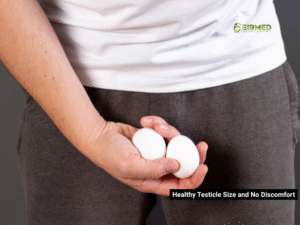Signs A Man Is Fertile | Strong Evidence for Conception Success 2025

8 Signs a Man Is Fertile: Essential Insights for Your Fertility Journey
 Signs a man is fertile can offer reassuring clues about reproductive health, especially when you’re thinking about starting or growing a family. At EIRMED, we understand how important it is to feel informed and in control. This guide breaks down key indicators straightforwardly, drawing from reliable health insights to help you recognize what your body might be saying. Whether you’re curious for yourself or supporting a partner, let’s explore these signs together, focusing on what matters most for male fertility.
Signs a man is fertile can offer reassuring clues about reproductive health, especially when you’re thinking about starting or growing a family. At EIRMED, we understand how important it is to feel informed and in control. This guide breaks down key indicators straightforwardly, drawing from reliable health insights to help you recognize what your body might be saying. Whether you’re curious for yourself or supporting a partner, let’s explore these signs together, focusing on what matters most for male fertility.
Signs That a Man Is Fertile
To identify signs that a man is fertile, let’s consider what observable or measurable indicators might suggest healthy reproductive capacity. What would you expect to see in a likely fertile man? Are these signs purely physical, or could they involve broader health factors? Let’s explore eight key signs, each with a heading to guide your reasoning. Reflect on why each might matter for fertility.
1. High Sperm Count
Why might the number of sperm matter? A high sperm count increases the chances of successful fertilisation. What factors could influence this?
2. Good Sperm Motility
What does it mean for sperm to move effectively? Strong motility ensures sperm can reach and penetrate an egg. How might lifestyle affect this?
3. Normal Sperm Morphology
Why is the shape of sperm important? Properly shaped sperm are more likely to fertilise an egg. What could cause abnormalities in sperm shape?
4. Healthy Libido
How does sexual drive relate to fertility? A strong libido often reflects balanced hormones, which support sperm production. What might low libido indicate?
5. Consistent Erectile Function
Why is erectile health relevant? Reliable erections suggest good blood flow and hormonal balance, which are key to reproduction. What health issues might disrupt this?
6. Normal Testicular Size
What can testicular size tell us? Testicles of average size (15-35 mL) typically indicate healthy sperm production. Why might smaller testicles raise concerns?
7. Balanced Hormone Levels
How do hormones like testosterone affect fertility? Normal levels support sperm production and overall reproductive health. What symptoms might suggest hormonal issues?
8. Healthy Body Weight
Why does weight matter for fertility? A healthy BMI supports hormonal balance and sperm quality. How might obesity or being underweight impact fertility?
Think about this: Which of these signs would you consider the most reliable indicator of fertility, and why? Would you prioritise medical tests like semen analysis or observable traits like libido? If you want to dive deeper into any sign or explore recent data on male fertility, let me know what intrigues you!
What Does Male Fertility Look Like?
 Male fertility involves producing enough healthy sperm to travel effectively to fertilize an egg. It’s influenced by sperm count, how well they move (motility), and their shape (morphology). A normal sperm count starts at about 15 million per millilitre, but it’s more than numbers; your daily habits and body signals matter too. Think of it as your body’s natural system working smoothly, without major hiccups.
Male fertility involves producing enough healthy sperm to travel effectively to fertilize an egg. It’s influenced by sperm count, how well they move (motility), and their shape (morphology). A normal sperm count starts at about 15 million per millilitre, but it’s more than numbers; your daily habits and body signals matter too. Think of it as your body’s natural system working smoothly, without major hiccups.
Many men don’t notice issues until trying to conceive, but positive signs that a man is fertile can build confidence early. Factors like age, diet, and exercise all tie in. For instance, fertility peaks in the 20s and 30s, but staying active helps maintain it longer. At EIRMED, our fertility-focused products, like zinc-rich supplements, aim to nurture these basics for better outcomes.
How Do You Know If A Man Is Fertile
Fertility in men generally refers to the ability to produce healthy sperm capable of fertilising an egg. But how can we assess this? What factors might influence fertility, and what methods could be used to evaluate it? Consider the following:
- Semen Analysis: Have you heard of this test? It’s a common way to assess male fertility. It measures sperm count, motility (movement), and morphology (shape). Why do you think these factors matter for fertility?
- Lifestyle Factors: What habits or choices might affect a man’s fertility? For example, could smoking, excessive alcohol, or a poor diet play a role? How might stress or physical activity influence sperm health?
- Medical History: Why might a doctor ask about past illnesses, injuries, or medications? Conditions like varicoceles, infections, or hormonal imbalances could impact fertility. What do you know about these conditions?
- Physical Signs: Are there any visible or physical signs that might hint at fertility issues? For instance, could changes in testicular size or sexual function be relevant? Why or why not?
- Fertility Testing: Beyond semen analysis, what other tests might a specialist use? Could blood tests for hormone levels or genetic screening provide insights? Why would these be important?
Key Physical Signs a Man Is Fertile
Your body provides everyday hints about fertility. These physical markers are often the first to check, reflecting internal health.
Healthy Testicle Size and No Discomfort
 One strong sign a man is fertile is having testicles that feel normal, about the size of a walnut, firm but not hard, without pain or swelling. This suggests good sperm production, since the testicles are the main site for creating sperm. Swelling or lumps could point to issues like varicocele, which affects blood flow and sperm quality.
One strong sign a man is fertile is having testicles that feel normal, about the size of a walnut, firm but not hard, without pain or swelling. This suggests good sperm production, since the testicles are the main site for creating sperm. Swelling or lumps could point to issues like varicocele, which affects blood flow and sperm quality.
Regular self-checks are simple: Gently feel for changes once a month. If everything feels right, it’s a positive indicator. Causes of problems might include infections or injuries, but avoiding tight clothing or hot environments helps keep things optimal. EIRMED offers at-home test kits and cooling gels to support testicular comfort and health.
Normal Hair Growth and Body Development
 Balanced facial and body hair growth is another clue to hormone levels that support fertility. Men with typical patterns without excessive thinning or unusual spots often have steady testosterone, key for sperm development. Abnormal breast growth or reduced hair might signal imbalances like low testosterone or gynecomastia.
Balanced facial and body hair growth is another clue to hormone levels that support fertility. Men with typical patterns without excessive thinning or unusual spots often have steady testosterone, key for sperm development. Abnormal breast growth or reduced hair might signal imbalances like low testosterone or gynecomastia.
Hormones drive this, and shifts can come from age or stress. Implications? Lower fertility if untreated, but diet tweaks with nuts and fish can help. Our hormone-support bundles at EIRMED include natural boosters like fenugreek to promote balance.
Consistent Semen Volume and Appearance
 Look for semen that’s white or grey, about 1.5 to 5 millilitres per ejaculation, roughly a teaspoon and slightly thick at first. This signifies that a man is fertile, indicating healthy prostate function and hydration. Watery or discoloured semen might hint at dehydration or infections.
Look for semen that’s white or grey, about 1.5 to 5 millilitres per ejaculation, roughly a teaspoon and slightly thick at first. This signifies that a man is fertile, indicating healthy prostate function and hydration. Watery or discoloured semen might hint at dehydration or infections.
Volume matters because it carries sperm effectively. Lifestyle plays a role in drinking plenty of water and eating fruits high in antioxidants, which supports this. If yours looks normal, it’s encouraging. EIRMED’s hydration mixes with electrolytes can enhance this aspect naturally.
Lifestyle-Related Signs of Male Fertility
How you live day-to-day reveals a lot about fertility. These behaviours often amplify physical signs.
Steady Energy and Physical Stamina
 Feeling energetic throughout the day? That’s a good sign a man is fertile, linked to balanced hormones and good circulation for sperm health. Low energy might stem from poor sleep or obesity, which can cut sperm motility.
Feeling energetic throughout the day? That’s a good sign a man is fertile, linked to balanced hormones and good circulation for sperm health. Low energy might stem from poor sleep or obesity, which can cut sperm motility.
Regular exercise, like walking and lifting weights, boosts the sperm counts of men with active jobs by up to 46% higher sperm counts. Aim for 30 minutes most days. At EIRMED, vitality supplements with ginseng help sustain that drive.
Calm Mood and Managed Stress
 A stable mood without constant stress is tied to lower cortisol, which otherwise harms sperm production. Frequent mood swings or depression could indicate hormonal shifts affecting fertility.
A stable mood without constant stress is tied to lower cortisol, which otherwise harms sperm production. Frequent mood swings or depression could indicate hormonal shifts affecting fertility.
Stress from work or life can reduce sperm by 30%. Breathing exercises or hobbies ease this. EIRMED’s stress-relief kits with ashwagandha promote calm for better fertility.
Strong Libido and Sexual Performance
 A healthy sex drive with no issues like erectile dysfunction is a direct sign that a man is fertile, showing solid blood flow and hormones. Problems here might relate to low desire or ejaculation troubles.
A healthy sex drive with no issues like erectile dysfunction is a direct sign that a man is fertile, showing solid blood flow and hormones. Problems here might relate to low desire or ejaculation troubles.
Testosterone fuels this, peaking early but maintainable with diet—foods like avocados aid flow. Our libido enhancers at EIRMED use safe, natural ingredients.
Deeper Hormonal and Sensory Signs
Some signs are less obvious but crucial.
Balanced Hormones Without Unusual Symptoms
Normal hormone levels mean no fatigue, weight gain, or smell issues; anosmia can link to genetic conditions like Kallmann syndrome. This affects sperm via hormones.
Blood tests check whether these supplements with vitamin D help. EIRMED offers testing guidance and balances.
No Recurrent Infections or Pain
Absence of repeated respiratory infections or groin pain suggests no blockages. Infections like STDs can scar ducts.
Hygiene and check-ups prevent this. Our anti-inflammatory products soothe minor issues.
When Signs Suggest Testing
If signs a man is fertile seem off, or after a year of trying, get a semen analysis, which checks count, motility, and more. Home kits or labs work. EIRMED provides easy options plus treatments like IUI.
Tips to Support These Fertility Signs
Boost signs with habits: Eat fish for omega-3s, avoid saunas for cool testes, wear loose underwear. Quit smoking, limit alcohol. Sleep 7-9 hours. EIRMED bundles make it simple.
Myo-inositol supports metabolic health for fertility, safe with a doctor’s approval.
Frequently Asked Questions (FAQs)
What are the common signs that a man is fertile?
Healthy libido, normal testicles, and steady energy indicate strong fertility.
How does age affect male fertility signs?
Fertility dips after 35, with lower sperm quality.
Can diet improve the signs of male fertility?
Yes, fish and veggies boost sperm health.
When should I test for fertility?
After a year of trying, or if signs worry you.
Are home fertility tests reliable?
They give initial insights and follow up with pro checks.
Overall Purpose: Empowering Your Fertility Awareness
This piece highlights eight signs a man is fertile to help you recognize strengths and areas for improvement in male reproductive health. Blending body signals with lifestyle tips guides informed choices for better sperm quality and family planning. Stay proactive with check-ups and supports like EIRMED’s offerings. Your journey to fatherhood starts with knowledge.
Disclaimer
This information is general and not medical advice. Consult a doctor for personal fertility concerns. EIRMED products aid wellness but don’t replace professional care.
Thank You for Joining This Fertility Conversation
Thank you for reading about the signs a man is fertile. It’s a step toward understanding and action. At EIRMED, we provide products and support for your journey. We appreciate your trust.

Eirmed is an informational platform dedicated to providing reliable, science-based insights on male and female fertility, reproductive health, and natural conception.
